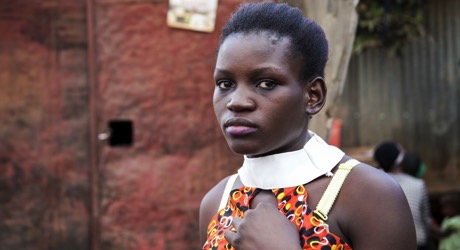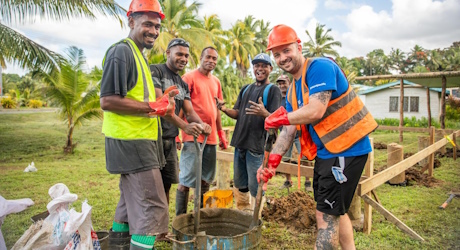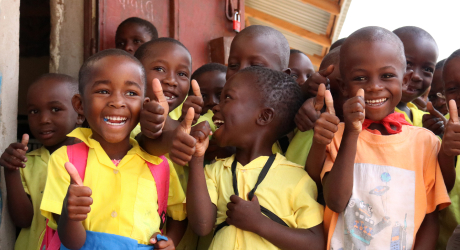Footprints Project
Since 2005, travelers like you have helped us change the world through micro-donations.

-
A total of
12969
Travelers
-
donated
$45007.95
(100% funded) -
to help improve
Equality
-
impacting
13097
people -
in
Uganda
The project continues to develop the capacity and agency of adolescent girls (13-18 years) and boys to promote girls’ rights, safety and inclusion in Kampala, Uganda.
Objective: Adolescent girls and boys are sensitised and supported to take action and leadership on gender inequality, sexual harassment and girls’ safety.
The project ensured adolescent girls and boys were at the forefront of implementation. They were provided platforms to speak during awareness campaigns with transit authorities; 151 (89 girls and 62 boys) were engaged and presented their asks to leaders at differing government levels.
• Girls working alongside boys aided the challenging of societal stereotypes. Boys and men have been involved and engaged to appreciate gender equality and the negative impact of maintaining an unequal gender order in the communities where they live e.g. through the Champions of Change modules which are tailored to shape the perspective of boys to understand gender, rights, violence and sexuality.
• The adolescent girls and boys engaged in Champions of Change demonstrate empowerment that is coherent with a shift in their attitudes and practices in gender equality and girls rights. They are more assertive, with confidence to talk about their issues, and the groups are used for engagement and commitment to their cause. The girl participants have continuously exhibited a sense of self-worth, confidence and self-respect while the boys are now more knowledgeable on girls’ rights and supporting them to stand for these rights.
• With two clubs in each school, there are now over 720 children members of the safety clubs in schools.
• The Champions of Change (CoC) community sessions are now attended by over 900 participants in different communities on a weekly basis.
• 16 girls, 8 boys, and 24 teachers participated in Training of Trainers (TOT) Champions of Change training to enable additional school clubs and training sessions to be established and operate into the future
• 8 girls clubs and 4 boys clubs participated in joint action planning.
• 12 clubs promote girl’s safety on National Day.
• 30 girls and 10 boys with disabilities were provided with support to establish youth associations.
Objective: Government, transport sector, parents and communities, have increased awareness on girls’ safety, and take action.
• Seven awareness sessions on safety and discrimination against girls with disabilities were conducted for parents and other community members
• Fathers’ and mothers’ safety clubs were formed by parents with an in-depth knowledge and understanding of the Safer Cities project. On a weekly basis during the parent club meetings, there are various sessions on changing attitudes towards gender stereotypes against girls, and understanding the roles and responsibilities of parents in creating safety for girls.
• Dialogues with parents: adolescent club members have been meeting with parent safety clubs to talk about safety in the area. Parents publicly express approval or defend their activities and right to take action and they also show commitment through collective action in support of girls’ safety in cities.
• Trainings on gender equality were carried out for taxi and bus operators. As a result, the men who were a part of the training have been able to change their behaviour and attitude towards their family members and adolescent girls they meet in public spaces. They are now championing the change in the transport sector.
• Equal participation was promoted in the transport industry, which is dominated by men. The Safer Cities team is working with the bus companies to recruit more young women, and lobbying is being done with taxi companies to ensure more women join their business. There has already been an increase in the number of women conductors.
• Two major public campaigns on street harassment, safety on transport; promoting coalition building were delivered.
• The first was an outside advertisement campaign. Educative messages about abuse against girls in public spaces were put on billboards and street poles. This had the purpose of getting the bus drivers, boda boda riders, taxi drivers, conductors, other operators and passengers to know about the project and to ensure they support making cities safer for girls. There has been feedback from the community that the messages are relevant and timely amidst challenges of violence of women and girls in public spaces. It was reported that sexual harassment has reduced due to the different messages published in the campaign.
• The solidarity campaign led to significant commitments from the Kampala Capital City Authority to make changes such as improving lighting and street naming, ensuring buildings meet accessibility standards, and running a public awareness campaign to change attitudes around street harassment.
As the leader of her girls safety group, Faridah has met with the local mayor to advocate on safety issues in her community, she has participated in a short video and street drama to raise awareness amongst adolescent girls about their safety, and she has participated in a televised people's parliament to promote safety and gender equality for girls. Faridah now feels more confident, she is able to speak up and express her views, and she is aware of her rights. She has returned to school and is determined to continue to be a leader in the Safer Cities program.
Faridah spoke to Plan International and said: "In my community, most of us are child mothers. Before, we never knew our rights but this program has taught us to stand up for ourselves. My family now see me as valuable, because of my goal that I want to be a champion of change in our society".
Adolescent girls as champions for gender equality and girls safety in cities
Adolescent girls in the capital city of Uganda, Kampala, are subject to street harassment and gender-based violence in their communities. The Safer Cities for Girls project has supported over 5,800 adolescent girls and 2,051 adolescent boys to champion gender equality and safety for girls in public places.
Faridah, 21, has become a 'Champion for Change' in the Safer cities for girls program and is the leader of her girls’ safety group. Faridah dropped out of school and is a single mother with two children. She used to sell nuts and chips by the roadside and worked in the evenings, from 6pm up to midnight, where she experienced harassment and robbery.
What next?
Aiding the sustainability of the project is the Safer Cities coalition, composed from different government departments and representatives from women’s organisations who can take lead through local ownership and capacity to deliver on the objectives of the program. Continuing to strengthen networks with like-minded organisations and coalitions enables us to jointly advocate for the issues of adolescent girls. The multi-sectoral networks are likely to influence policy and practice nationally and locally.
Similarly, the program has built the capacity of local community structures. The adolescent girls and boys clubs has enabled the participation and mobilization of their peers; equipping them with the skills to advocate and build a movement of girls who can demand their rights. It is expected that these efforts will be sustained after the program has ended.
Traveling soon? When you buy travel insurance with us, you can make a contribution towards a cause you care about.
Get a quote






